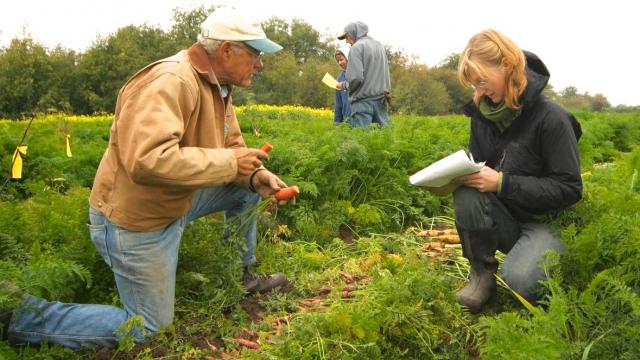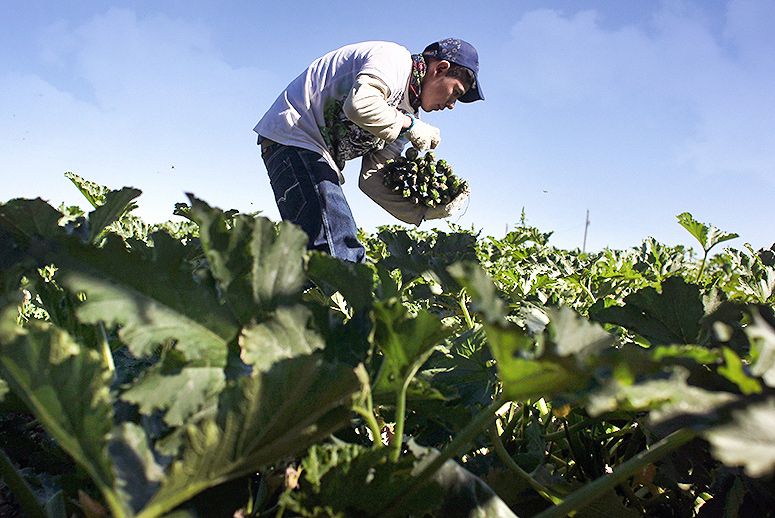
More than 4 million acres of U.S. farmland now are devoted to organic agriculture, according to a new report from the market research firm Mercaris, a record that marks an 11 percent increase over two years ago. The number of certified organic farms is close to 15,000, rising just over 6 percent since 2014.
While it may not be shocking that hotbeds of consumer demand for organic food such as California and New York are among the leading states in the total acreage of organic farmland—with 688,000 acres, California is No. 1—that Montana, Wisconsin, and North Dakota round out the top five is something of a surprise.
Montana’s 30 percent increase of 100,000 acres of organic acreage since 2014 bumps it into the No. 2 spot, while North Dakota’s increase of more than 40,000 acres pushes it past Oregon, which now ranks sixth. Colorado and Texas round out the top eight.
To be sure, the amount of organic cropland in the U.S. remains but a sliver of the total overall. Organic corn, wheat, and soybeans each account for less than 1 percent of the total number of acres planted with each crop. The largest organic crop, oats, accounts for 3.6 percent of all the oats grown in the U.S.
But double-digit growth in organic farmland is nothing to sniff at, and as you might expect, it’s a trend fueled by a consumer demand for organic products that continues to boom. According to the Organic Trade Association, sales of organic products grew almost 11 percent last year, the fourth straight year of double-digit growth. Compare that with the relatively meager growth rate of the market for food products overall (3.3 percent in 2015), and you can see why big food companies such as General Mills are committing themselves to expanding their organic offerings—which in turn is driving them to launch programs aimed at further increasing the amount of organic farmland in the U.S.
“I think we will see more of an impact of those programs in the next few years as more farmers start the transition process [to organic],” Alex Heilman, sales associate at Mercaris, told Civil Eats.
As more Americans make the switch to buying everything from organic eggs to organic cereal, it has created something of a paradox: The U.S. exports more grain for animal feed than any other country in the world, but because so many of our crops are conventionally grown—i.e., genetically modified and sprayed with pesticides—those same crops can’t be used in the production of organic food at home. Thus, the U.S. has been forced to import an increasing amount of organic feed from other countries. Imports of organic corn, for example, tripled over the last year, according to Bloomberg News, and it is primarily used as feed for dairy cows to help meet Americans’ demand for organic milk, which has tripled since 2007.
In a week that has been consumed by election news, and in a country trying to come to grips with Donald Trump’s upset win over Hillary Clinton, it can seem like small potatoes to go all rah-rah over a report that organic acreage has hit a record high in the U.S. While there’s ample reason for progressive-minded folks who have been advocating for a more sustainable food supply to despair over the sort of setbacks a Trump administration might pose—for example, cutting funding to the federal programs designed to help farmers make the transition to organic — it’s also worth remembering that we don’t just vote our conscience every two or four years at the polls; in our market-based economy, we vote every day with our wallets.
Organics have long benefited from a kind of halo of healthy goodness. But when it comes to promoting sustainable agriculture and its related environmental benefits, committing to buying organic when you can is one of the best things you can do—whether we’re talking about avoiding GMOs or reining in the amount of toxic agrochemicals polluting our land and water. After all, a company like General Mills isn’t getting ready to launch a program devoted to increasing the amount of organic farmland out of the goodness of its heart; it’s doing it because consumers are essentially calling for it every time they choose organic oatmeal over conventional. Small choices really can add up to big differences.
3 WAYS TO SHOW YOUR SUPPORT
- Log in to post comments













Comments
DH Fabian replied on
Priorities
Americans overall are poorer, and organic foods cost more.